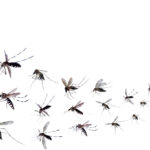Experts weigh in on the threat mozzies pose this year and how to protect patients.
Increased detection of potentially deadly encephalitis viruses in mosquitoes and a rise in Ross River virus notifications has prompted a warning for GPs to test patients who present with non-specific symptoms.
Public health alerts have been issued in NSW and Victoria following detection of Murray Valley encephalitis virus in mosquito surveillance programs.
There has also been evidence of Japanese encephalitis virus (JEV) in people and animals across NSW, Victoria, and South Australia so far this summer, said Associate Professor Cameron Webb, a mosquito expert from NSW Health Pathology and the University of Sydney.
“It’s important that GPs are aware that mosquito-borne disease is a potential occurrence in many parts of Australia,” he told The Medical Republic.
“There is often a perception that there is only a risk in tropical regions of Australia or that it is only international travellers returning from a country with outbreaks of dengue or malaria that are at risk.”
Given the highly variable symptoms associated with local mosquito-borne diseases, Professor Webb said it was important that GPs familiarise themselves with case definitions provided by their local health authorities but also remain mindful that confirmation of infections requires blood tests.
“Encouraging patients to get tested to confirm infections has great benefits for both the patient but also local health authorities who can use human disease notification data to assist development of public health responses,” he said.
“It is important too that GPs are aware that there is a safe and effective vaccine available for Japanese encephalitis, and local health authorities will be able to provide information on eligibility and availability.”
It’s not only the encephalitis viruses that should be on the radar for clinicians. Data from the National Notifiable Disease Surveillance System (NNDSS) showed that at 25 January, there had already been 156 cases of Ross River virus reported. The bulk of these cases have been in Queensland (87) and NSW (39).
Last year there were 2866 cases, the bulk in Queensland (834), NSW (725), Victoria (577) and Western Australia (434).
There have been 45 cases of JEV reported in Australia since 1 January, 2021. Seven people have died from the virus since then.
QIMR Berghofer’s Mosquito Control Laboratory head, Associate Professor Greg Devine told The Medical Republic that increased surveillance for mosquitoes carrying JEV had improved since the virus outbreak took a hold in early 2022.
“The Japanese encephalitis virus outbreak in 2022 really kicked off in February-March [2022] and we assume that surveillance has probably gotten better since then,” he said.
“I think it’ll be two or three months before we determine exactly what’s going to come of all the mosquito activity associated with the flooding in NSW and Victoria, and possibly now of course in North Queensland as well.”
Professor Devine said the increase in JEV cases had put the issue of mosquito-borne viruses under the microscope and GPs were now much more aware of the need to consider this in patients who presented with non-specific symptoms like joint pain and fever.
Professor Webb said mosquitoes thrived in warm and wet conditions, and three summers dominated by La Nina weather patterns – meaning rain and flooding in many eastern Australian states – had created “perfect conditions” for mosquitoes.
Recent flooding in northern Western Australia had brought ideal conditions to those parts of the country too.
“Unfortunately, there aren’t many places in Australia this summer that are free of mosquitoes or their pest and public health threats,” he said.
And while summer may be almost two-thirds over in Australia, mozzie-friendly conditions were far from over, Professor Webb said.
“Unfortunately, mosquitoes and the threat of mosquito-borne disease is going to be with us for many months to come,” he said.
“Rainfall and flooding is continuing and we’re starting to see much warmer temperatures in many parts of the country too,” he said.
“We are likely to have a risk of mosquito-borne disease well into Autumn. It is also an important reminder to GPs and the community that, historically, peaks in mosquito-borne disease often occur in late Summer and early Autumn.”
While it might be impossible to avoid mosquitoes when outside, he said some measures could be taken to avoid mosquito bites.
“Application of topical insect repellents, covering up with light-coloured loose-fitting clothing, and trying your best to avoid bushland and wetlands areas at dusk and dawn when mosquitoes are most active will all assist in reducing the risk of mosquito-borne disease,” he said.





